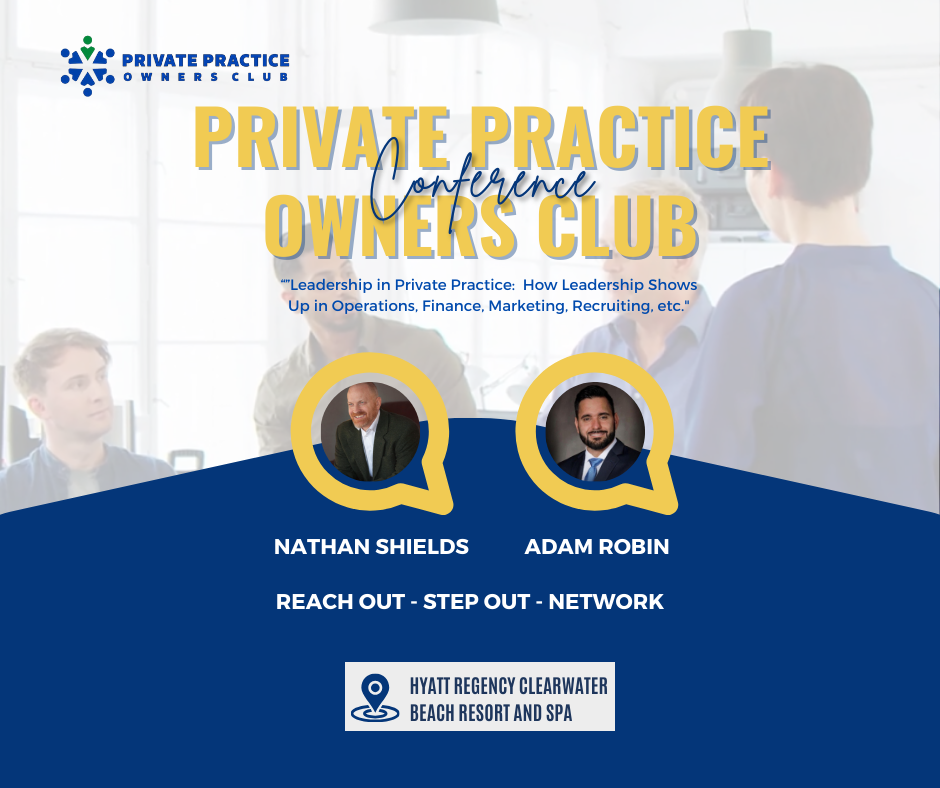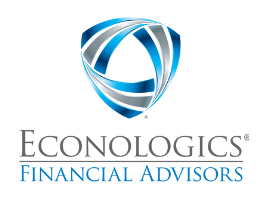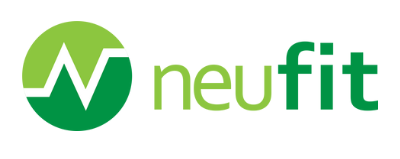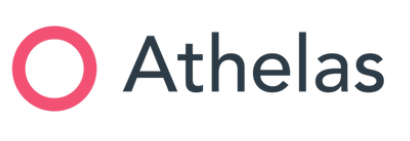Private practice owners CLUB CONFERENCE 2024 RECAP
The Private Practice Owners Club Conference 2024 was a resounding success, bringing together leading private practice owners and industry experts for a day of insightful discussions, networking, and actionable takeaways. Attendees left inspired and equipped with practical strategies to elevate their practices through effective leadership in every key area of business operations.
Private Practice Owners Club Conference 2024 Recap: Leadership Edition
This year’s conference highlighted Leadership as the cornerstone of building and maintaining a successful private practice. The sessions, led by industry experts, provided invaluable insights for practice owners looking to enhance their leadership skills and grow their businesses.
Leadership And Physical Therapy
John Bradley's presentation on leadership in physical therapy focuses on the challenges and misconceptions that practice owners often face when it comes to leadership. Drawing from his personal experiences as a long-time private practice owner, he emphasizes that leadership is not about titles or authority but about creating a culture of trust, safety, and consistency within a team. He shares his journey of making numerous mistakes in leadership, including poor management and a lack of clear roles, which led to business failures. Through these experiences,
Bradley
highlights the importance of self-improvement, building solid structures, and focusing on the people around you to become an effective leader.
READ MORE
Bradley argues that leadership is a learned skill, and practice owners need to prioritize the well-being of their staff to achieve success. He stresses that leaders must consistently ask themselves how they can support and help their staff grow, rather than focusing on their own comfort or authority. By fostering an environment where staff feel safe and valued, leaders can inspire cooperation and better performance. Ultimately, Bradley's presentation offers practical insights into how to become a better leader, emphasizing the need for personal accountability, humility, and a commitment to serving others in order to build a successful practice.
How to Move Up
Adam Robin presented an engaging session on
"How to Move Up,"
focusing on transforming chaotic work environments into productive and fulfilling workplaces. He shared his personal journey since opening his clinic in 2019, emphasizing the need to shift from a
"Get Stuff Done" mentality driven by fear to a mindset prioritizing time over money.
Adam introduced the concept of the Pain Line, encouraging attendees to identify triggers that hinder productivity and to delegate tasks effectively. He advocated for the
"Buyback Loop," emphasizing the importance of investing in one's time and focusing on high-value activities that energize and motivate. The session highlighted that growth should enhance freedom rather than increase pain, urging participants to trust the process of transformation.
READ MORE
Adam further explored the significance of creating a comprehensive playbook of Standard Operating Procedures (SOPs) and strategic planning to streamline operations and reclaim control over time. He advocated for transformational leadership, moving away from transactional management practices that limit team empowerment. Key insights included the necessity of authentic feedback and effective time management techniques, which can foster a culture of accountability and growth within the organization. By balancing health, wealth, and relationships, Adam encouraged attendees to take actionable steps toward "buying back their life," emphasizing that strategic planning and empowered leadership can lead to a thriving and sustainable business model.
Building Personal Wealth & Financial Security
In his presentation,
Eric S. Miller
emphasizes the critical financial challenges faced by practice owners and outlines actionable strategies to achieve personal wealth and financial security. He highlights a common misconception among owners: the underestimation of the income, assets, and resources needed for both professional and personal success. By providing a detailed retirement planning formula and showcasing the significant impact of practice management on overall profitability,
Miller illustrates
how strategic financial planning can create a desired income that exceeds pre-retirement lifestyle needs. He also discusses the importance of efficiently managing profits and expenses to enhance practice value and secure long-term financial health.
READ MORE
Miller introduces the Econologics® philosophy, advocating for practice owners to run their households like parent companies, emphasizing the necessity of proactive financial management and prudent investments. He stresses the importance of building a comprehensive financial plan that incorporates customized business and personal targets, while also upgrading financial advisors to those who understand the unique needs of practice owners. By focusing on financial education, establishing clear goals, and seeking specialized guidance, Miller believes practice owners can achieve economic freedom, maintain a comfortable lifestyle, and enjoy their professional lives while preparing for a successful retirement.
Tech Leadership in the Modern Practice
In
Tech Leadership in the Modern Practice,
Sharif Zeid, founder of Empower EMR, discussed how technology can enhance leadership in physical therapy practices. Drawing from nearly two decades of experience in the PT tech space, Zeid shared insights on fostering connected and efficient practices through strategic use of technology, particularly electronic medical records (EMR) systems. His approach focuses on implementing systems that streamline operations while reinforcing leadership. Zeid highlighted that technology should ideally bring people together, aligning teams, and improving patient care.
He introduced Empower EMR as a versatile tool for practices, offering features like AI-assisted documentation, built-in billing, a patient portal, and compliance tools to promote stability and reliability.
READ MORE
Zeid outlined five key strategies to make tech and EMR central to a practice’s leadership approach: leading from the front, investing in the right technology, maintaining a positive attitude and effort, measuring progress, and increasing transparency within the team. He emphasized that effective technology purchasing, process alignment, and transparent communication foster stronger team cohesion and patient outcomes. Zeid ended with a demo of Empower EMR, underscoring its track record of meaningful, continuous innovation. The presentation concluded with an invitation to further explore Empower EMR’s capabilities at their upcoming PPS booth, showcasing how technology can bridge leadership and operational efficiency in modern PT practices.
Positive Intelligence in Leadership
Karen Edwards, a Certified Positive Intelligence Coach, led a transformative session on Positive Intelligence in Leadership, exploring how mindfulness and mental fitness can significantly enhance a leader’s performance. By mastering where the mind goes and identifying self-sabotaging habits, leaders can shift from a survival mode driven by fear, judgment, and reaction to a more empowered, positive mindset. Karen introduced the concept of the "Judge," which undermines leadership by feeding negative thoughts, and how accessing the Sage—through tools like empathy, curiosity, and intentional action—can foster growth and improve team dynamics. Attendees discussed how their own saboteurs, such as the Avoider, Hyper-Achiever, or Stickler, limit their leadership potential and explored strategies for overcoming these barriers. Key insights included the CTFAR Model, which demonstrates how thoughts create results, and how shifting from fear-based thinking to an inspirational leadership style can have a ripple effect throughout their practice. The session underscored that leaders who prioritize mental fitness and purpose-driven leadership can decrease burnout, increase resilience, and create a culture of growth and shared values.
READ MORE
Karen also emphasized the Four Pillars of Leadership, where purpose, vision, and culture play essential roles in a thriving practice. By recognizing how saboteurs like the Hyper-Achiever or Stickler can interfere with these pillars, attendees learned how to access their Sage through micro-meditations and positive thinking habits. This session encouraged practice owners to reframe their leadership approach by questioning negative thoughts, focusing on shared goals, and aligning with their larger vision. As Karen reminded us, “You are creating what you are thinking and believing,” and the leaders who can master their mindset are the ones who inspire others to action. By tapping into the Sage, leaders foster an environment where creativity, curiosity, and resilience thrive, helping them and their teams navigate challenges with confidence and purpose.
PPO Club Wrap Up
In his presentation PPO Club Wrap Up, Adam Robin outlined a framework for building a successful practice by focusing on three main pillars: patients, team, and finances. He emphasized creating a loyal patient base, building a connected and fulfilled team, and establishing predictable financial outcomes for both personal and business growth, which he called “The Triple Win.” Robin stressed that the core goals for a thriving practice include systemizing and automating operations, assembling a strong, cohesive team, and ultimately scaling the business for long-term success. He explored two primary challenges facing practice owners—maintaining a “GSD (Get Stuff Done) Mentality” while balancing the empathetic “Therapist’s Heart.” Robin pointed out that the journey of a practice owner involves continual growth and self-belief to harness their potential and create a sustainable vision.
READ MORE
Robin introduced three progressive programs designed to assist owners at various stages of growth: the CEO Kickstart Program for practices aiming to establish themselves and achieve a $30K monthly revenue within 90 days, the CEO Accelerator Program for owners reaching the $400K mark and needing to refine organization and team-building, and the forthcoming CEO Mastery Program, targeted at practices with $1.2M+ in revenue, ready to implement a 10X scale strategy. Each program focuses on guiding owners through phases from "getting started" to "scaling," reinforcing the importance of taking ownership and regaining control over one’s practice journey. Robin’s ultimate message was empowering owners to believe in themselves, seize control of their business destinies, and maintain a vision of constant improvement.
Marketing in the Age of AI
John Mason, co-founder of E-rehab, shared invaluable insights on
Marketing in the Age of AI and how to leverage ChatGPT for transformative results. With over 20 years of experience in the physical therapy industry, John highlighted the efficiency and cost-effectiveness of using AI to streamline marketing efforts. He introduced attendees to the basics of ChatGPT, explaining how practices can harness its generative abilities to create content such as blogs, emails, and social media posts. Through practical examples and a step-by-step guide, participants learned how to build a customized marketing strategy using AI, emphasizing that while ChatGPT is a powerful tool, it's essential to plan before acting and tailor its output to their unique practice needs. John also walked through creating a practice profile file, the setup of a custom GPT, and demonstrated how easy it is to integrate AI tools into everyday marketing workflows, from generating content to organizing marketing calendars.
READ MORE
John also introduced the AARRR Framework (Acquisition, Activation, Retention, Referral, and Revenue) to help practice owners think through the patient lifecycle and align their marketing strategies accordingly. He emphasized that consistency in marketing execution, made possible by ChatGPT, is key to saving time, improving tracking, and ensuring strategic focus. Additionally, John stressed the importance of leadership in marketing efforts, encouraging practice owners to engage their teams in marketing tasks and use AI to delegate more efficiently. Through a well-planned marketing calendar and clear direction, practices can achieve better resource allocation and reduced stress. In closing, John shared a variety of AI image-generation tools, such as DALL-E and Canva, offering even more opportunities to enhance marketing materials with visual content. The session underscored the importance of adopting AI to stay competitive and efficient in today’s digital marketing landscape.
How to Lead Your Front Desk Team for Success
Dee Bills delivered an insightful presentation on leading front desk teams, emphasizing the importance of structure and discipline in fostering a successful workplace. She outlined common staff problems such as disorganization, lack of teamwork, and difficulty meeting deadlines. By identifying the root causes of these issues, Dee emphasized the need for preventive measures, including hiring the right candidates, clearly defining expectations, and providing comprehensive training. She highlighted that unresolved issues can lead to increased chaos and instability, underscoring the necessity of addressing problems promptly and compassionately. The session provided practical strategies for creating a supportive work environment where staff members can thrive and contribute positively to the team.
READ MORE
Dee also discussed the significance of open communication and transformational leadership in effectively managing staff. She stressed the importance of having difficult conversations with care, framing them as opportunities for growth rather than punitive measures. By scheduling timely check-ins and focusing on clear expectations, leaders can empower their team members to take ownership of their roles. The session concluded with a reminder that successful teams are built on strong relationships and effective management practices. By fostering a culture of accountability and support, leaders can cultivate a motivated front desk team that enhances the overall patient experience and contributes to the success of the practice.
Inaugural Private Conference 2024
At the
Inaugural Private Conference 2024
hosted by the Practice Owners Club, leaders
Nathan Shields, Adam Robin, Tanny Crawford, Cory Lee, and Tracy Bond
shared insights on
"Leadership in Private Practice."
They welcomed private practice owners to explore a new mindset around ownership, encouraging them to shift from
self-employed ("S")
to
business owner ("B")
roles, as outlined by Robert Kiyosaki's Cash Flow Quadrant. Shields and Robin explained how moving up the organizational hierarchy creates more value for both the owner and the business, and they prompted attendees to analyze their positions within their organization’s structure. They stressed the importance of delegating tasks that consume time and energy, allowing owners to focus on higher-level strategic roles for sustainable growth.
READ MORE
The conference encouraged attendees to set personal goals for the event, committing to seek answers and connections for growth. Keynote speaker James Wedmore underscored the importance of valuing time over money, which fosters success in both areas. Attendees were guided through an exercise to reflect on barriers holding them back from embodying the ownership they aspire to, considering the influence of their leadership on their teams, communities, and families. The event recognized sponsors like Sharif Zeid from Empower EMR, Eric Miller from Econologics, and John Mason from E-Rehab, among others, and closed with a call for ongoing commitment to the owner’s journey and leadership.
What Attendees Are Saying
Feedback from Practice Owners Who Attended the Conference
Hear firsthand how the insights and strategies shared at the 2024 Private Practice Owners Club Conference are transforming practices and empowering leaders.
What Other PT Owners Are Saying
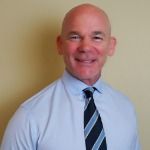
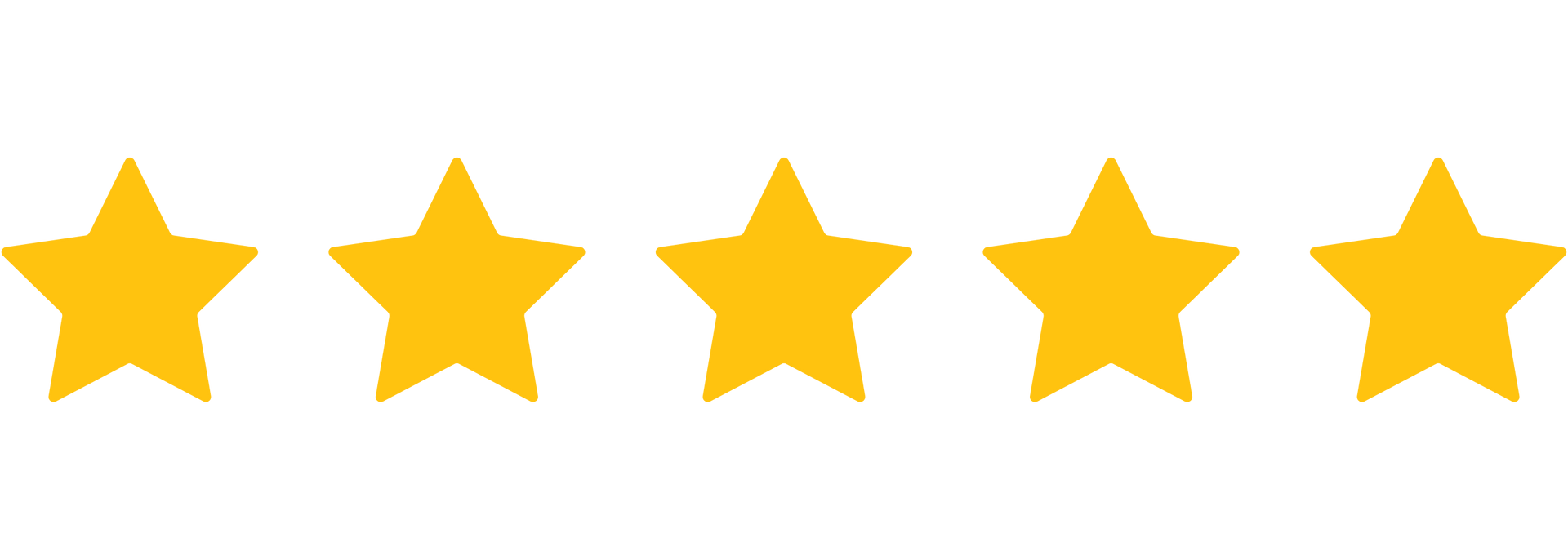
“Nathan really understands the PT industry and what is important to owners. His thoughtful interviews bring great value to the audience and help us all move forward in our quest for ownership mastery.”
MATT SLIMMING, PT


You are the product of the people that you spend the most time with. If you want to be a millionaire then you have to hang around with millionaires. Connect with those who are on your path or have reached your goals.
DAVID BAN, CEO
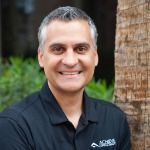

Leveraging the experience of a “guide” or “mentor” who can help you gain clarity and hold you to the edges, or just beyond, your comfort zone. Because this is where the growth happens.
STEVE EDWARDS, PT


“Working 60 plus hours per week and worrying about costs and overhead. Barely seeing my family during waking hours. Meeting Nathan was a huge blessing. He helped me see that I can not carry the business while being the primary clinician. He helped guide me to make good decisions.
I still have a full caseload, but now have time built in to work on the business and have learned how to better delegate to other clinicians and support staff.”
DR. RYAN WOOLEY, PT


“I had to empty my personal savings account to keep up with payroll. Having to pull my family’s safety net from under us was immensely stressful. Every payroll cycle I would worry about keeping up with demand.
Nathan helped me figure out how to address problem areas and encouraged me to start keeping new statistics to better address our new and changing needs. We saw movement in our once-stalled cash flow. Employees are more engaged during meetings and take pride in our success. There has been a ripple effect of positivity throughout the clinic. We have turned things around and have a plan going forward. It is not an overstatement to say that his program helped save my business. I could not ask for better results.”
PRATIK SHAH, PT
We are proud to have as our sponsors:
Take Control of Your Practice
Join The PT Owners Community
Ready to Take Control of Your Practice?
Start your working with our community of Physical Therapy Owners today and take control of your clinic. Tap into customized coaching, peer insights, and exclusive educational resources. Its as easy as joining our Facebook Group.



